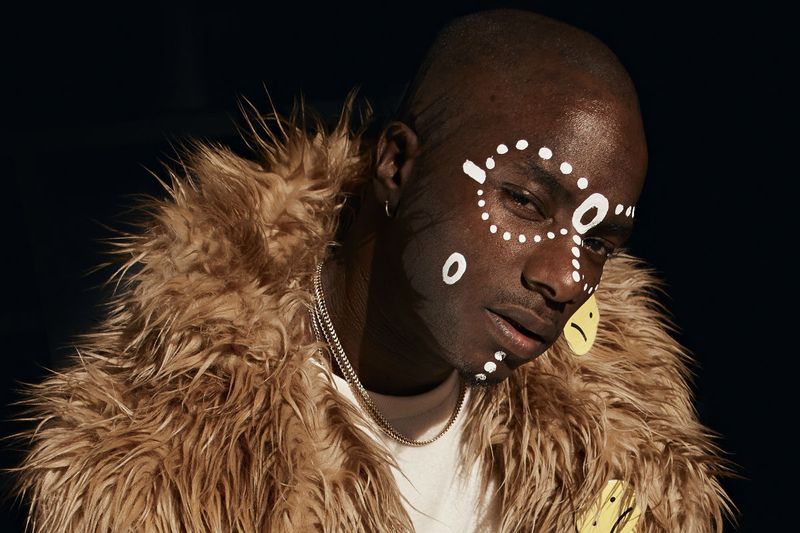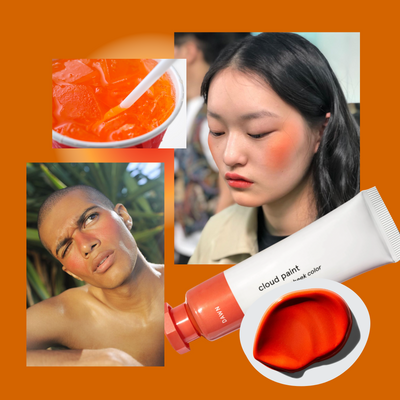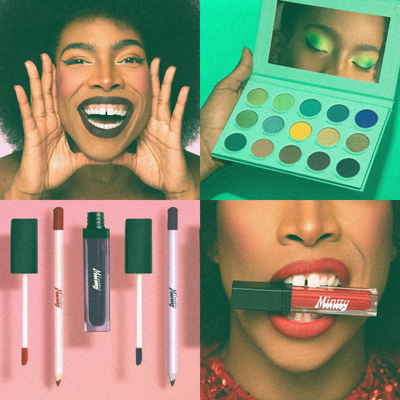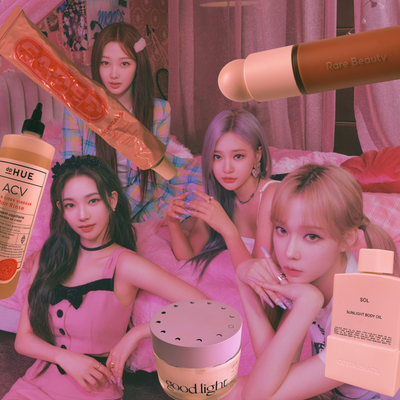From a young age, Milandou Badila, the rapper now known as Young Paris, was made to feel beautiful.
It was at 3, after all, when he was given his first maquillage (that’s French for makeup). In his case, he was fully painted with a single color and marking, a Congolese tradition that’s a rite of passage of sorts, one that cements one’s own tribal individuality.
In the Congo, yellow symbolizes the bright, bold sun. Red symbolizes the blood of the people. Green is for the land that provided food. White was to pay homage to past spirits, those who once roamed the good Earth. That was Paris’ color. And at 3, his beauty, as he recalls, was embellished by several white dots carefully placed under his eyes. Over time, he’d add a crescent in the middle of his Crown Chakra and dashes over the eyes to make it even more personal.
[aesop_image imgwidth=”80%” img=”/content/images/wp-content/uploads/2017/01/yp9.jpg” credit=”Hennessy Vandheur/Very Good Light” alt=”Young Paris” align=”center” lightbox=”on” captionposition=”left” revealfx=”off” overlay_revealfx=”off”]
“Self-expression is very important, especially when dealing with African men,” he explains. We’re sitting at Chapter 2 showroom in the Flatiron district where racks upon racks of menswear surrounds us. For being a loud presence onstage, surprisingly, Young Paris’s voice is once decibel above a whisper. It’s soothing, approachable.
“Men are the ones who enhance their beauty even more,” he says. “If you look throughout the world and the animal kingdom, it’s the males that are highlighting their beauty. The men in the animal kingdom are beautified whether from lions, tigers, or peacocks.”
This explains why Young Paris is unafraid to be bold in his appearance: “In my culture, femininity is strong. It’s in us to express our femininity.” As he explains it, being a whole person means balancing both his masculine and feminine sides.
It’s definitely an eyebrow-raising statement, one that seems like the antithesis of traditional hip hop and its hypermasculine history and American culture in general.
“The super hypermasculinity of hiphop culture taught us that a man had to be a certain way,” he says. “It’s ironic then, that you saw other super masculine guys with their pants down with their asses out. It doesn’t make any sense.”
[aesop_image imgwidth=”80%” img=”/content/images/wp-content/uploads/2017/01/young-1.jpg” credit=”Hennessy Vandheur/Very Good Light” alt=”Young Paris” align=”center” lightbox=”on” captionposition=”left” revealfx=”off” overlay_revealfx=”off”]
To him, the current crop of artists pushing culture forward like Young Thug, who dresses in womenswear, and Lil Uzi Vert, who’s rarely seen without rainbow-colored locs, are the ones who are affecting hip hop. To be a success today, he says, it’s all about being original, embracing your individuality, while respecting each others in the process.
“I think when you hear [homophobia or misogyny in rap] it sounds so irrational and aggressive,” he says. “Like, why bro? Chill out. No one cares about this shit. Anyone who is affecting pop culture has a way open mind when it comes to sexuality. Who’s really over-masculine, homophobic and heterosexual who is actually doing anything in pop culture?”
Anyone who is affecting pop culture has a way open mind when it comes to sexuality. Who’s really over-masculine, homophobic and heterosexual who is actually doing anything in pop culture?
It was his upbringing in Congo and being raised in Paris and New York City, then attending college that he was able to have a wider scope of the world. “I had to learn about people’s perspectives,” he recalls. “Some of my friends were gay. I could care less what a guy was doing on his own time and learned to open my mind. Having homosexual friends helped reshape the masculinity and femininity in my own life.”
[aesop_image imgwidth=”80%” img=”/content/images/wp-content/uploads/2017/01/yp1.jpg” credit=”Hennessy Vandheur/Very Good Light” alt=”Young Paris” align=”center” lightbox=”on” captionposition=”left” revealfx=”off” overlay_revealfx=”off”]
Having homosexual friends helped reshape the masculinity and femininity in my own life.
It fits in line with his own culture. “In Africa, the men wear more makeup and fancier costumes,” he says. I want to remind the public that I’m an African artist.” Which isn’t something Paris shies away from. His debut album as a new signee under Roc Nation, is called “African Vogue,” composed of a collection of tracks infused with heavy Afrobeat influences.
“For me, my paint is my cultural reminder of who I am,” he says. “You know, you can lose yourself, there’s a lot of drugs, a lot of parties. My paint is a reminder that I’m standing for myself always.”
[aesop_image imgwidth=”80%” img=”/content/images/wp-content/uploads/2017/01/YP2-1-e1483404900755.jpg” credit=”Hennessy Vandheur/Very Good Light” alt=”Young Paris” align=”center” lightbox=”on” captionposition=”left” revealfx=”off” overlay_revealfx=”off”]
Which means taking a stand for others, as well. For Young Paris, he wants to push the message of inclusivity forward. That you can be who you want to be and express yourself with your own authenticity.“It takes bravery to be who you want to be, for sure,” he says. “But when you are bold and confident in who you are, no one can say anything about that.” A sentiment we definitely stand behind.
Photos by Hennessy VandheurProduced by Sarah SpringerEdited by Maya TanakaLocation: Chapter 2 Showroom (Special thanks to Clara Jeon)






